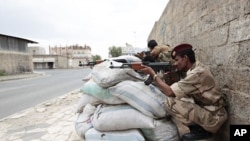Dozens are dead or wounded as mounting violence in Yemen is taking on new dimensions. President Ali Abdullah Saleh is calling for the arrest of a powerful tribal chieftain whose clan has been battling government soldiers for days. Concerns are rising that the nation is facing all-out civil war.
The orders to arrest Sadiq al-Ahmar came on the fourth day that heavy fighting between members of the sheikh's Hashid tribe and government forces rocked the capital.
Government officials have accused al-Ahmar and his supporters of staging an armed rebellion. The sheikh's brother, Hussein al-Ahmar, says it's the government which has been doing the attacking.
Hussein al-Ahmar, speaking on U.S. government-funded al-Hurra television, says Mr. Saleh is no longer in a position to issue orders, nor is he capable of arresting any member of the Ahmar clan. He says the president has lost his legitimacy.
The street battles of recent days and the tribal nature of the clashes mark a sharp escalation in the unrest. Some Sana'a residents have been fleeing the capital, while the U.S. embassy has ordered all non-essential personnel to leave the country.
Dozens of people are reported to have been killed in overnight fighting, while dozens of others are said to have died in the clashes in previous days.
The al-Ahmars' Hashid tribe, of which Mr. Saleh is a member, is among the most influential in Yemen. Leaders early on in the four-month uprising sided with anti-government protesters, whose initial goal was to usher in reforms, but now want Mr. Saleh's more than three decades in power to end.
The president says the country will be dragged into civil war if he leaves, but even as battles raged, protesters Thursday continued to hold demonstrations.
Protesters kept a chant calling for Mr. Saleh to go. The president has said three times he is willing to transition away from the leadership, in a deal brokered by the Gulf Cooperation Council. But he has each time backed out at the last minute, most recently on Sunday.
The protesters, who took their inspiration from the uprisings in Egypt and Tunisia, have remained out on the streets throughout, even as their movement, like those in Syria and Bahrain, has been thwarted.
Protester Abdullah Mohammad accuses the government of wanting a civil war.
He says the people don't want a conflict, just the end of what he calls the corrupt regime.
Fellow demonstrator Raja Saleh says Yemen is already on its way to civil war.
She says it could be avoided if President Saleh signs the GCC deal.
Mr. Saleh went on Yemeni television Wednesday to say he is still ready to go along with the plan.
But the president says the initiative first needs a framework in order to be implemented. Many of Mr. Saleh's opponents believe he is simply stalling, hoping the growing divisions will further his argument that only he can ensure stability.
Even his nominal supporters, including U.S. President Barack Obama, called on him this week to fulfill his commitment to a transfer of power. On Thursday, U.S. Secretary of State Hillary Clinton said Mr. Saleh has repeatedly "reneged" on plans to step down. Clinton said the U.S. and its allies are working to get him out of office.
Hussein al-Ahmar, of the Hashid tribe, says that no matter what Mr. Saleh does, he ultimately will not dictate the fortunes of a nation run by tribal factions.
He says the president has tried several times in recent months to provoke a civil war and has been searching for a pretext. Al-Ahmar says he won't be able to do so, as he has no control over anything outside the capital - where tribal allegiances dominate.
With street battles consuming some neighborhoods, and demonstrators camped out in others, it's not clear how much of even the capital Mr. Saleh controls.
Dozens Dead, Wounded as Yemen on Brink of Civil War




